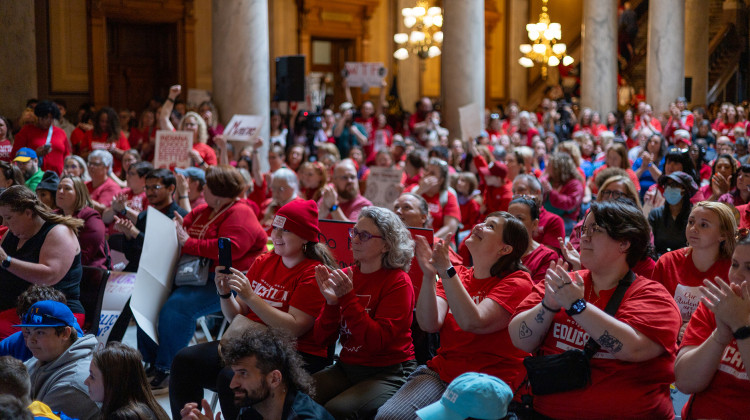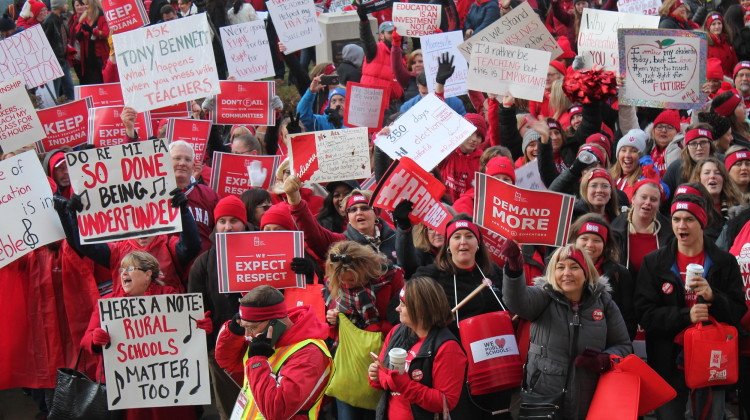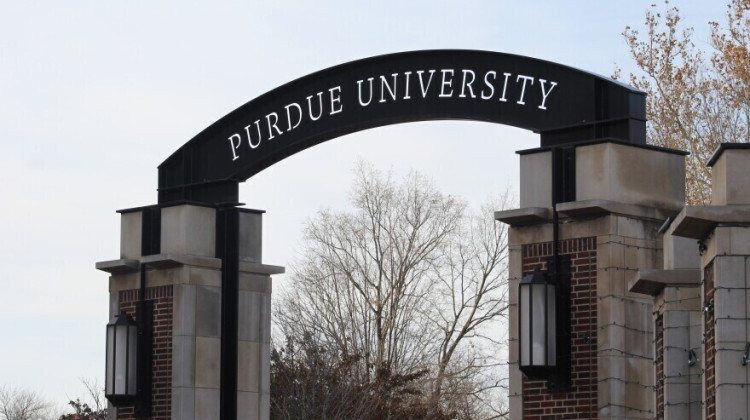
Under the approved House Bill 1447 school districts and charter schools are required to establish a procedure to allow parents and community members to file challenges to books they believe to be inappropriate.
Eric Weddle / WFYIThe Indiana legislature approved a controversial bill Thursday that centers on what books students should and should not have access to in school. The final version of the legislation was largely decided behind closed doors.
Under House Bill 1447, school districts and charter schools are required to publicly post their library catalogs and establish a procedure to allow parents and community members to file challenges to books they believe to be inappropriate. The bill also bars public school employees from using a book’s educational value as a legal defense against charges they distributed material that is harmful to minors.
The bill now heads to Gov. Eric Holcomb.
It’s the latest development in a months-long debate over Republican-driven legislation intended to respond to concerns about pornography in schools. Lawmakers have presented little evidence to show that obscene books in schools are a widespread problem.
Some of the books that Republican lawmakers likened to pornography — including the memoir “Gender Queer” — deal with LGBTQ themes and characters. Democrats opposed the bill expressing concern that it could have a chilling effect on the types of books children have access to in schools.
“If you want to stop our children from learning about alternative lifestyles and things like that …stop using this as a way to get to it,” said Sen. Greg Taylor (D-Indianapolis) during testimony on Thursday.
Taylor also criticized Republicans for bringing final language to the floor for a vote without giving the public a chance to view and weigh in on it.
Sen. Jim Tomes (R-Wadesville) authored the initial bill that the language appeared in — Senate Bill 12, which was approved by that chamber earlier this year. But the proposal stalled in the House when it was added as an amendment to another bill, and the House Education Committee chose not to vote on it.
Then, in the final days of the legislative session, Republican lawmakers revived the language in private and added it to HB 1447 — a bill that focuses on surveys provided to students by third-party vendors.
Tomes appeared to be satisfied with the final version of the legislation. During Senate testimony, he mentioned emails that he and his wife received from people who supported the measure. He said the messages came from within and outside of Indiana, including people from Tennessee, Georgia, Kentucky, North Carolina and South Carolina.
“It really got to me, these people that we don't know, who wrote personal letters, to let Margie and I know they were praying about this,” he said.
Realistic portrayals
The legislation has evolved since its initial approval in the Senate, and debate in the House Education Committee. The key changes include removing public libraries from the bill and continuing to allow school employees to defend themselves against charges they distributed harmful material to children on the basis that they did so while performing their job duties.
Rep. Becky Cash (R-Zionsville), one of the Republicans who worked on this legislation, said public libraries were removed from the legislation during discussions between members of the House and Senate.
“We would have at least liked to have the transparency part of it there, which the public libraries were perfectly fine with, but in getting it moved forward, we were satisfied with where it ended up,” Cash said. “At the end of the day, the schools are the location where parents can't be.”
During testimony Thursday, House Democrats voiced their opposition to the legislation, and their concerns that it would empower a minority of parents to decide what all children can read. They expressed concern that this legislation would lead to the removal of books about race and LGBTQ identities.
“Some people will try to say this is pornography, and it's harming our kids,” said Rep. Matt Pierce, (D-Bloomington). “What it is, is young adult fiction that talks about lesbians and gays and people that are different than some of us. And it's giving us a realistic portrayal of the challenges and the burdens and the struggles that those minorities face.”
Pierce said allowing some community members to force their value systems on schools and children will make life harder for LGBTQ youth.
This sentiment was echoed by Rep. Renee Pack (D-Indianapolis), whose daughter, Leah Johnson, is a queer author; her award-winning debut novel, “You Should See Me In A Crown,” centers on a Black queer teenager. Pack said her daughter was inspired to write books that include queer characters to show youth that they are not alone.
“That's what these books can do for youngsters. But we, in all our knowledge and wisdom, choose to take them away. It is wrong. We got to stop thinking about us and our own beliefs and consider that somebody out there might be different and it's okay. It's perfectly okay,” Pack said.
But Republican members of the House disagreed with this interpretation.
“This is giving parents greater transparency with what's in their libraries. This is just school libraries where they drop off, you drop off your kids, you put them in the hands of those librarians. And the parents want to say, can I see what's in that school? It's all this bill does,” said Rep. Martin Lehman, (R-Berne).
Rep. Martin Carbaugh, who helped craft the final version of the legislation, said the bill is not about banning books with LGBTQ themes or books about race from school library shelves. He said a book would only be removed if it met the standard for obscene or harmful material under existing Indiana law.
“That's a really high standard,” Carbaugh said. “I trust our local school boards to get it right. And if enough in the community think our local school boards don't get it, right. We've got elections.”
Holcomb can sign the bill into law, allow it to become law without his signature, or veto the measure.
IPB News reporter Adam Yahya Rayes contributed to this story.
Contact WFYI education reporter Lee V. Gaines at lgaines@wfyi.org. Follow on Twitter: @LeeVGaines.
 DONATE
DONATE






 Support WFYI. We can't do it without you.
Support WFYI. We can't do it without you.